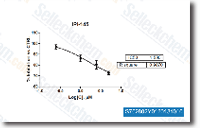To relate mitogenic input to response to GBP we examined non invasive MCF 7 breast cancer cells, which have low levels of ErbB2, in their na ve state and when treated with cholera toxin. We found that cholera toxin raised active ERK levels, accelerated cell proliferation and accentuated akt gene expression, thus changing the phenotypic aspect of your cells. Examination of cell response to GBP showed that although, as reported previously, in the na ve MCF 7 cells cell rep lication was inhibited by GBP, the MCF 7CTx cells resisted the growth inhibitory impact of GBP to succumb, after 12 division cycles, to sudden death, once more mimicking the response on the BT474 and SKBR3 cancer cells. Next, we investigated whether PI3K was once again a key responder for the action of GBP and whether negation of akt gene expression will be the consequence.
To safe maxi mum expression of akt mRNA a replacement we applied MCF 7CTx cells and carried out time scale experiments utilizing GBP in parallel with wortmannin and LY294002, each pharmacological inhibitors on the p110 catalytic subunit of PI3K, added at con centrations which would make an impact related to that of GBP, and assessed PI3K activity and akt mRNA levels. Fig ure 4eg shows that GBP lowered PI3K activity to a related extent as the two inhibitors, but using a a lot more gradual kinetic, in line with the action of a physiological effector molecule, and that akt gene expression was negated when PI3K activity had similarly descended by an approximately 35% quantum under basal levels, in all three instances.
This proof indicates that PI3K activity is a required requirement for akt gene expres sion, and that basal or close to basal endogenous levels are sufficient. The similarity selleck INK1197 of the impact exerted by GBP with that of wort mannin and LY294002 in regard of each inhibitory pattern and the time necessary for the inhibitory action to come into impact indicates that, as reported previously, remedy with GBP may possibly lead to conformational adjustments which would lower the functional capability of the catalytic web page of your p110 subunit of PI3K. Discussion The importance of PI3K in the basic processes that lead to tumourigenesis has prompted the development of modest membrane permeable molecules aimed at targeting elements with the PI3K pathway for therapeutic intervention against cancer.
The present study suggests that this aim is often achieved employing the GBP cytokine, a all-natural inhibitor of PI3K whose physiological nature carries no chemothera peutic disadvantages. Secreted by CD4  and CD8 activated T cells and by somatic cells, endogenous GBP controls cell cycle entry and SG2 traverse. In its recombinant kind GBP binds with higher affinity to about 5104 receptorscell, and at a concentration selection of 1 to 20 nM GBP induces inhibition of cell proliferation through SG2 cell cycle arrest that, while reversible in regular cells, can lead can cer cells to death by way of routes that, through downregulation of PI3K activity and suppression of Ras ERK signalling, result in cyclin kinase downregulation, deregulated E2F1 transactivation and apoptosis.
and CD8 activated T cells and by somatic cells, endogenous GBP controls cell cycle entry and SG2 traverse. In its recombinant kind GBP binds with higher affinity to about 5104 receptorscell, and at a concentration selection of 1 to 20 nM GBP induces inhibition of cell proliferation through SG2 cell cycle arrest that, while reversible in regular cells, can lead can cer cells to death by way of routes that, through downregulation of PI3K activity and suppression of Ras ERK signalling, result in cyclin kinase downregulation, deregulated E2F1 transactivation and apoptosis.
Stat Pathway
Gain-of-function mutations in the STAT3 gene have been reported to cause multi-organ early onset auto-immune diseases.
